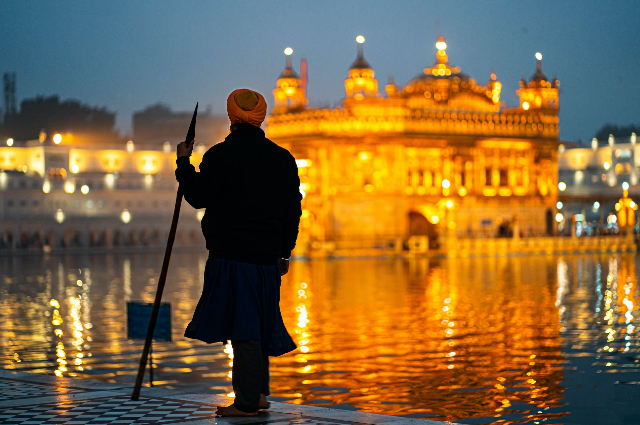
“Bole So Nihal, Sat Sri Akal”
With this thought, I Kashvi Arora, would like to start with my essay.
The word “Sikh” means “Seeker of Truth.” Sikh thought signifies a simple but most dignifies synthesis of spiritual and temporal life through the value system. It attains universal salvation and leads the whole human society towards a higher moral life. Exercising the values and virtues in a normal domestic life is to be considered as the fountainhead of moral values. The emergence and development of Sikhism is one of the most inspiring and exciting eras of world religious history. The process was based on the features of democracy, secularism and socialism without any barriers.
Sikhs are meant to uphold the values of honesty, compassion, generosity, humility, integrity, service, and spirituality on a daily basis. Sikh prayer ends with a wish for the welfare of all mankind. A Sikh place of worship welcomes people of all faiths and backgrounds. Many Sikhs wear five articles of faith to express their commitment to these values, including long hair that men and some women wrap in a turban.
In Sikhism, Realization of God leads to unity of mankind, thus building the faith in the dignity of human values that strengthen and encourages the concept of live and let live. This concept of Supreme value helps in creating an ideal society, and further efforts can be put in to give it a practical shape.
There are three core tenets of the Sikh religion: meditation upon and devotion to the Creator, truthful living, and service to humanity. The religious philosophy of Sikhism arose primarily as a non-Vedantic process of thought in the historical conflict in opposition to the feudal value-pattern. The founder of the Sikh religion, Guru Nanak, developed a harmonious theoretical setup which included a spiritual beginning that inspired an individual through the experiences in the day-to-day life. Sikhism, a monotheistic religion, believes that there are many ways of reaching God. It rejected idol worship, caste system and ritualism as these are irrelevant factors in the process of acquiring salvation. Sikhism propagates the virtues of the life of a householder and totally rejects asceticism.
In the Sikh metaphysical concept, God is the Ultimate Reality, and man is capable of realizing the Ultimate through realization of the Divine Light, which is within him. To achieve this, he has to organize his activities as per the teachings of the Gurus. Therefore, the Sikh Value System is based on the compositions contained in the Sikh Scriptures. All the values help in enhancing the inner self of an individual. Values are spiritual, social, survival and ultimate.
Naam creates a feeling of the realization of God’s grace within oneself. This feeling of harmony ultimately results in the uttered becoming one with the uttered. Practice of Naam leads to cultivation of virtues, which is essential for becoming a good human being. Guru Nanak says that only the holy name is valuable, rest all is pride of self. By honest means of earnings, one can prohibit oneself from getting involved in evils of the society such as robbery, prostitution, beggary etc. and build up an honest character.
The value of sharing what you have with the needy is a spiritual and secular service to mankind. Sikhs have been contributing to setting up of hospitals, educational institutions, accommodation at religious centres, renovation of old gurdwaras and Langar system for all. This seems to be a proven tendency to implement the values in present day life. The value system inculcates strength, confidence, sincerity, goodness, truthfulness, et al. that helps in transforming the life of an individual. His good deeds encourage him to lead a contented life.
I would like to put forward this famous Sikh salutation:
“Waheguru Ji Ka Khalsa Waheguru Ji Ki Fateh”
Guru Gobind Singh Ji had said, “My face will be towards that person who says it first. My back will be towards that person who says it afterwards. I will be in between both of them, if both of them say it together.” Hence, in order to spread the message of brotherhood, we should say Fateh together.
Waheguru as in whole word means the greatest of the greatest that holds the power to eliminate the darkness from mind and turn it into light of God. However, before we can eliminate it we need to find out that what it is that we want to eliminate, and what form is darkness; darkness can be lust, anger, greed, attachments, ego, hate, anger, backstabbing, steeling, lying, cheating, misleading, misrepresenting etc. Therefore, waheguru ji ka khalsa means purity belongs to waheguru, the creator.
As a faith rooted in love, Sikhism stands for the equality of women and men and denounces any discrimination pertaining to gender, race, caste, creed, or colour.
With the Naam of "Satnam Waheguru"
I would like to end up here.
